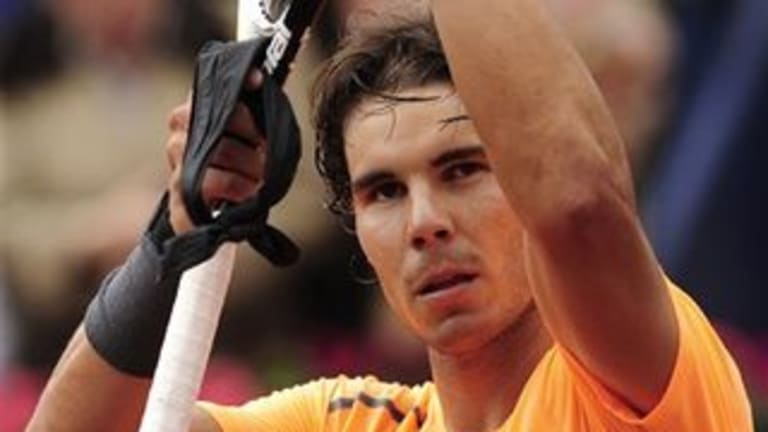Rafael Nadal’s seventh title in Barcelona looks more likely than ever after today's 6-0, 6-4 defeat of Fernando Verdasco in the semifinals.
Of course, it has never looked precisely unlikely, not when Nadal has won his last 74 matches on clay during the month of April and beaten Verdasco the last 12 times they have played. That streak encompasses scintillating epics, one-sided drubbings, and forgettable, regrettable encounters. Today’s match definitely fell into the latter category.
Nadal played a flawless first set, dismissing any attempt at resistance with the same disdain with which he swatted away a short ball at the net to break in the first game of the match. Throughout the course of the set, during which Verdasco won just 10 points, Nadal was positively strutting and vibrating with energy, looking as fresh and hungry as if winning this tournament wasn’t becoming routine for him. And although Verdasco played well enough, when Nadal is constantly hitting winners from defensive and impossible positions, there is little that anyone can do.
Accepting Nadal’s victories on this surface as inevitable, however, does a disservice both to how hard he and his opponents work, and the progression of the second set demonstrated how much better Verdasco could have done today. Admittedly, Nadal’s level took a dip in the second set, as it is wont to do after such a straightforward first, but it was only after Verdasco was a set and a break down that he started to play the kind of tennis that he should have been playing from the start—tennis which would have given him at least a fighting chance of disrupting Rafa’s stampede towards the final.
In those final three games, we saw Verdasco serve much bigger. Having been previously content to roll his first serves in, presumably in the hope of avoiding the double faults that can plague his game, Verdasco was consistently punished for it and ended the match having won 53 percent of points behind his first serve (he won just 25 percent in the first). Serving bigger let him use his big forehand in its most devastating capacity as a first-strike weapon, and it’s astonishing how such a simple change brings Verdasco’s whole game into focus. He also played much more patiently in the rallies, aiming for consistent depth and penetration on the groundstrokes rather than going for outright winners. He even earned two break points when Nadal was serving for the match before squandering them with missed returns. (I lost count of the number of times Nadal served to Verdasco’s forehand, but it seemed to catch him by surprise almost every time.)
Nothing can change the fact that Nadal does certain things better than Verdasco—movement, consistency, hitting winners from defensive positions (especially out wide on the forehand)—but if Verdasco wants to make some inroads on that head-to-head, now 13-0, he should remember how he played in those final games. Meanwhile, tomorrow it will be David Ferrer’s turn to try everything to reverse a trend of losing against Nadal in an attempt to snatch the Barcelona trophy, which after today seems all but in the six-time titlist's hands.
